Since the Boeing 737 Max Is Still Flying, Let's Examine Trump's Boeing Connections
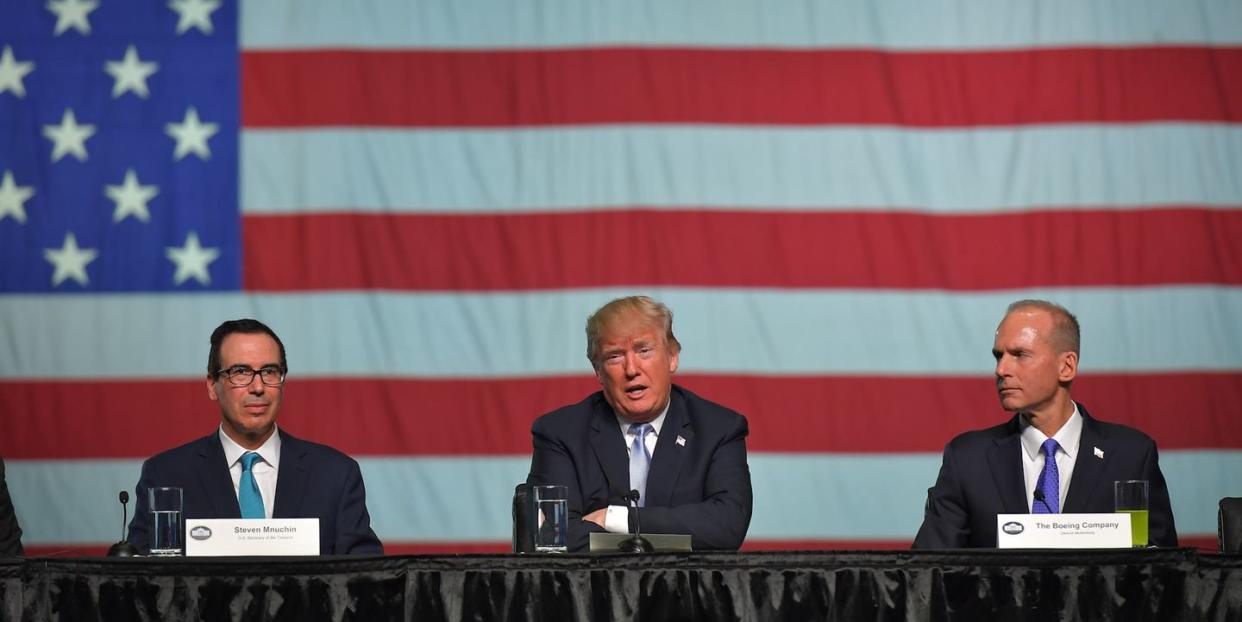
This is an exceptional country, we often hear, and this fine Wednesday, the United States is exceptional in a new way: its aviation regulator, the FAA, is essentially one of just two major nations' that is still allowing the Boeing 737 Max 8 to fly in its airspace. Two of the planes-Boeing's newest model-have crashed worldwide in the last six months. The latest went down on Sunday, as Ethiopian Airlines Flight 302 was lost shortly after takeoff, killing all 157 people on board.
This prompted authorities in Europe, China, Indonesia, Singapore, Australia, the UAE, Hong Kong, New Zealand-pretty much everywhere outside the U.S. and Canada-to ban the planes from their airspace. They were joined by some carriers in Africa, South America, and North America. In all, two-thirds of the jets are grounded worldwide. The reasoning is fairly straightforward: the cause is still undetermined, and could be down to pilot error. But the Ethiopian Airlines crash has a number of similarities with the prior Boeing 737 Max 8 incident, a Lion Air flight in October. The New York Times has the background:
One overarching concern among regulators around the world is whether the system suspected of playing a role in the Lion Air crash had contributed to the latest accident. Indonesian and American authorities have raised the possibility that a new system in the 737 Max - and pilots’ lack of familiarity with it - could have contributed to the Lion Air Flight 610 crash. The plane’s so-called maneuvering characteristics augmentation system, known as MCAS, was a new version that could automatically change the aircraft’s trajectory.
The similarities, with both planes crashing minutes after erratic takeoffs, are driving authorities to order the groundings. Despite Boeing and American authorities standing behind the plane, regulators and carriers elsewhere are opting to ban the plane in the absence of clear information.
The Times goes on to say that pilots tend to be less experienced, and more reliant on automated systems to fly planes, in markets outside North America. U.S. operators are more confident their pilots can deal with issues as they arise. But a separate Times report found at least two pilots flying the Boeing 737 Max 8 model on U.S. routes "filed incident reports with the federal government that raised concerns about safety and criticized a lack of training on the new plane." CNN reports at least five U.S. pilots reported problems controlling the jets "during critical moments of flight in recent months."
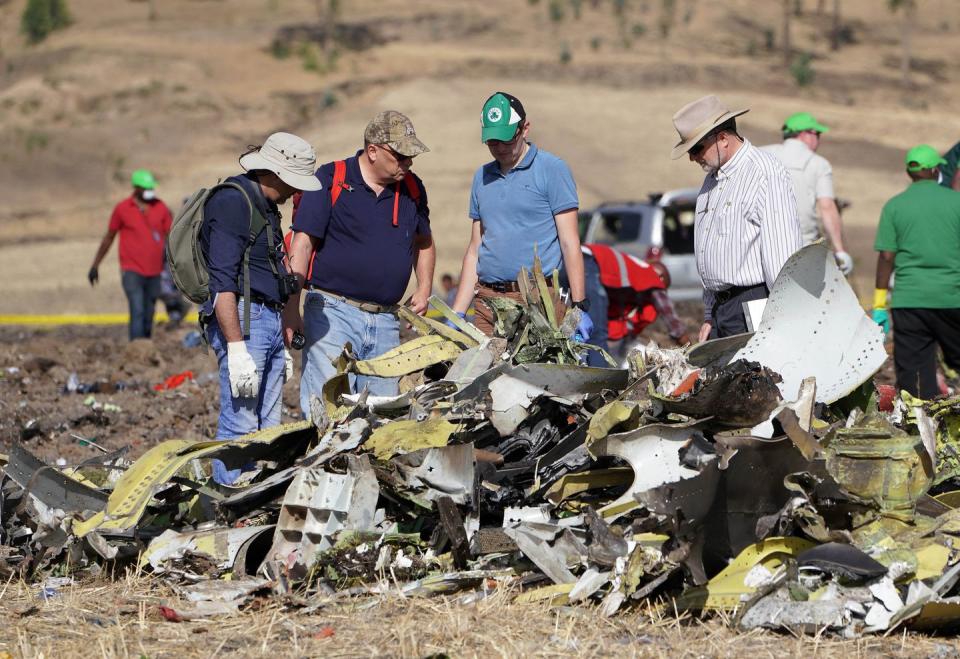
The response from U.S. authorities has generally been that they're waiting for the results of the Ethiopian Airlines investigation to make a decision on grounding the aircraft. Canadian officials suggested their decision is tied to the results of the U.S. investigation, which is moving along now that Ethiopian authorities have sent the plane's black boxes abroad for analysis. But this seems like an opportunity to exercise an abundance of caution. That U.S. authorities have not prompts further questions.
After all, both the Washington Post and the New York Times report that Dennis Muilenburg, the CEO of Boeing-which manufactures the planes-spoke to President Trump early Tuesday and urged him not to ground the planes. (In a barely comprehensible tweet Tuesday morning, Trump seemed to suggest the technology on modern planes in general is too complex. According to a source in the Post, the tweets did not prompt Muilenberg to call the president.) That approach is predicable, but Muilenburg has sought to extensively cultivate a relationship with Trump. They met at Mar-a-Lago and Trump Tower after the president protested publicly about the size of Boeing's contract to build a new Air Force One, and seemed to cozy up to one another after reaching a $3.9 billion deal on the project. "Dennis Muilenburg, friend of mine. A great guy," Trump said in June. "The head of Boeing. And, boy, have you done a good job on all fronts-commercial, military."
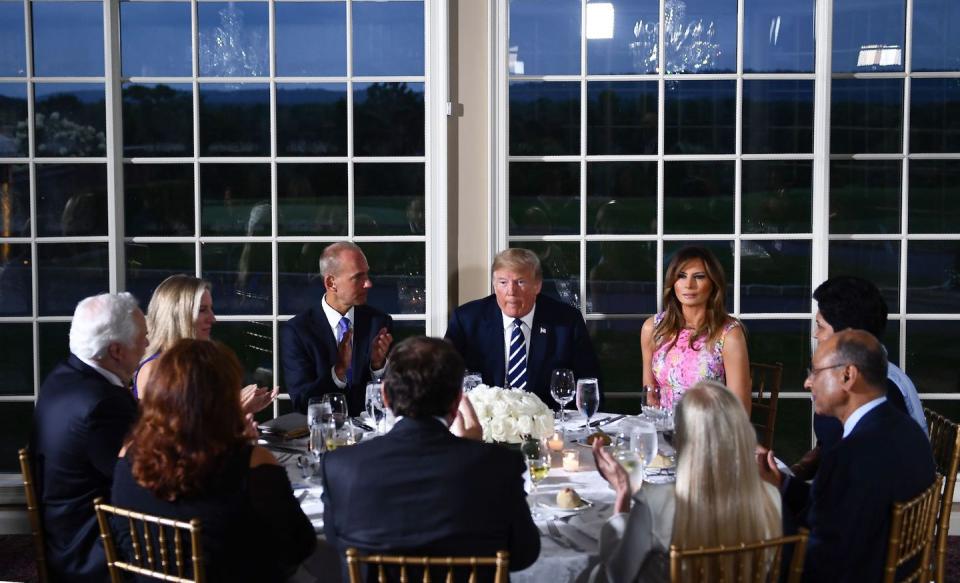
Muilenburg was with Trump, according to the Post, when the president called top Pentagon brass to compare Boeing's F/A-18 Super Hornet to the much-maligned F-35, built by Boeing's chief defense-contractor competitor in Lockheed Martin. In fact, there are longstanding questions over whether Boeing enjoys undue influence in Trump's Department of Defense, particularly after the firm scored three multi-billion-dollar aircraft contracts despite massive delays on a recent Defense project.
This culminated with the rise of Patrick Shanahan, a 31-year veteran of Boeing, to become the acting Secretary of Defense. Trump publicly praised Shanahan, who has negligible military and foreign policy experience, as a "good buyer" of military equipment after he appointed him-a sign of what the main qualification for the job was. A Pentagon official told the Post that Shanahan "had no responsibility over the 737 Max" in his time at Boeing. Maybe he just knew the guy who did.
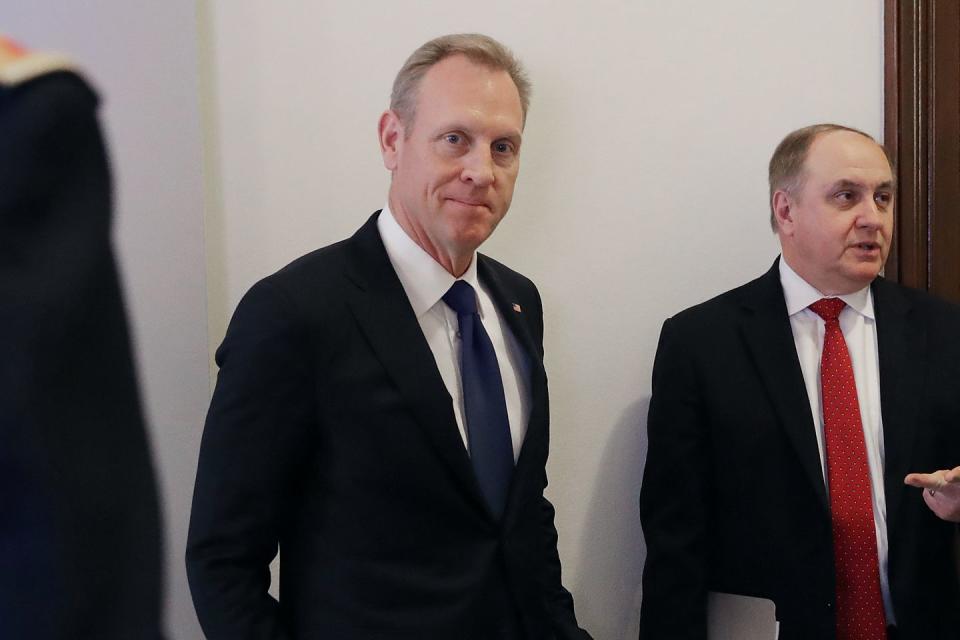
Elsewhere, the WaPo reports Muilenburg did Trump a serious solid:
After several CEOs resigned from Trump’s manufacturing council in 2017 over the president’s handling of a white-supremacist rally in Charlottesville, Muilenburg kept a low profile and did not speak out against Trump. The president disbanded the council amid growing backlash.
There's no reason to conclude yet that the 737 Max decision has anything to do with Boeing's extensive ties to this administration. After all, Boeing has had extensive ties to pretty much every administration since Dwight D. Eisenhower warned us all about the military-industrial complex. They donated $1 million to Trump's extremely-under-investigation inaugural committee, sure. But in January, President Obama spoke at a Boeing retreat in Arizona. He reportedly waived his speaking fee for the event, but the firm gave $10 million towards his presidential library in Chicago. Obama followed his presidential predecessor, George W. Bush, who spoke at the event last year. Boeing gave $10 million to Bush's library, too.
Still, the question must be raised in this era of Donald Trump, American president. The plane is a Boeing model, and Boeing's stock has already taken a major hit, and it has extensive ties to Trump's administration, and the CEO has extensively cultivated a relationship with Trump. The question must be raised because you can't ever be sure that Donald Trump, American president, is making decisions because they're in the best interests of most American human beings. We are forced to ask, every time, whether Donald Trump is just making the best decision for Donald Trump.
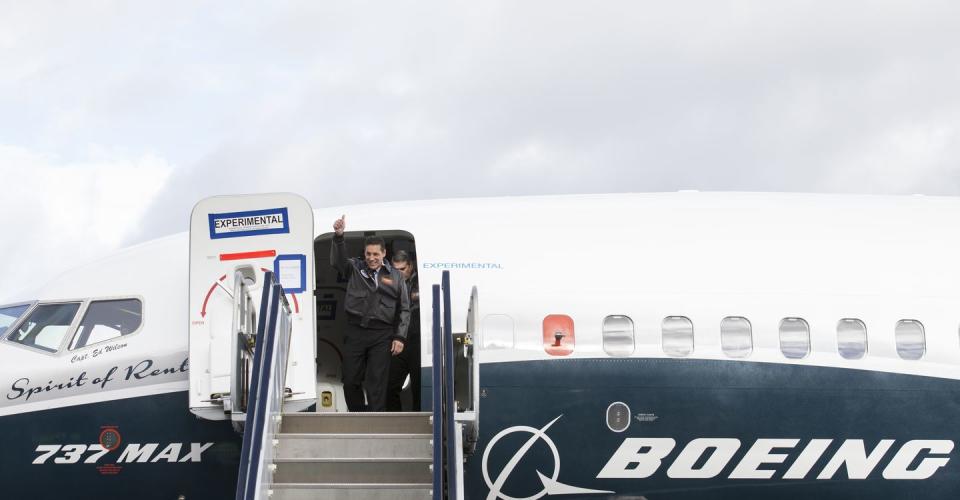
That's really what's at the root of the quest to get hold of his tax returns and develop a blueprint of who's funneling money into his businesses, which he refused to actually divest from while serving as president. Who's putting money in his pocket, and what do they want from the U.S. government? There's also the more innocent-though potentially no less perilous-explanation that someone has cultivated him by telling him he's very beautiful and very smart, or that he heard something about the issue on Fox News that he likes and any additional information is simply not going to enter his cranium.
When he refuses to accept the U.S. intelligence community's assessment that Saudi Arabia's senior leadership ordered the brutal murder of U.S.-resident journalist Jamal Khashoggi, is it because he really believes Crown Prince Mohammed bin Salman is innocent, or because the Saudis are putting money in his pocket through his hotels? When the U.S. breaks with much of the rest of the world on grounding a potentially dangerous aircraft model, is it a decision made on the merits, or because the right guy knows the right guy?
These are the fundamental questions undergirding all those discussions about ethics and conflicts of interest and the looming specter of high-level corruption. All of these questions should be asked of every administration and every president, but it's hard to doubt anymore that we're dealing with something of an entirely different kind. Pretty much every organization the president has ever run is currently under investigation by state or federal authorities or both. His Cabinet is a carousel of grifters and industry insiders peddling influence. Often their behavior does not rise to the level of criminality, it's merely an assault on the public trust or the public good. Sometimes, though, the consequences might be life and death.
('You Might Also Like',)

